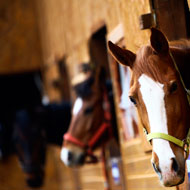New horse passport "doomed to fail"

Equine charities are concerned new laws will pose a "serious risk" to horse welfare.
More than a year on from the horse meat scandal, equine vets are concerned that a new horse passport system would place an "unworkable obligation" on them to check horse owners have filed the correct paperwork.
Under the new proposals, vets could be breaking the law if they do not realise a horse owner has forgotten to get the animal's ID endorsed by the passport issuer, and rectify the mistake.
This would require the vet to know which of the 70 plus passport issuers in the UK - or many others elsewhere in the EU - had registered the horse.
BEVA chief executive David Mountford has slammed the draft passport system, calling it "totally ridiculous, almost impossible to implement and doomed to fail."
He explains: "Vets should be accountable for the medicines they prescribe but the responsibility for the drug residues in the individual horse and the horse’s passport documentation should logically lie with the horse owner or keeper as it does with every other species that may end up in the human food chain."
Flaws in the current passport system were underlined last year when it was revealed food products labelled as beef contained horse meat.
As well as causing concern among vets, equine charities also have concerns about the possible welfare implications.
World Horse Welfare's (WHW) chief executive, Roly Owers says the new laws, if adopted, could pose a "serious risk" to horse welfare.
In some respects, the charity says the proposals include "significant improvements" to the current system - such as a centralised equine database for member states, improved ID document standards and microchipping of all horses.
However, it is felt the new laws could discourage horse owners from making responsible end-of-life decisions. Under the new system, ID is required to accompany the carcase for destruction. Collection vehicle drivers who take the carcase away without ID would be breaking the law.
It is feared welfare will be compromised as animals with insufficient paperwork will not be euthanised at the end of their life, because the keeper is not able to have the carcase collected.
WHW points out that in many cases, the ID will not be available, or the horse will never have been issued with ID - for example if it is under a year old, is a stray, has been abandoned, comes off a moor or is a road casualty.
Mr Owers says: "This risks leading to a situation where animals that do not have an ID will not be put down at the end of their life, where there is a welfare need to do so, simply because the keeper will not be able to have the carcase collected.
"This could lead to even more animals being dumped and to consequential welfare problems."
The new system is currently being considered by the European Union and the standing committee are due to take a vote this week.
WHW is urging the UK not to support the proposed new laws and has written to the secretary of state with its concerns over the latest draft.



 The Federation of Independent Veterinary Practices (FIVP) has announced a third season of its podcast, Practice Matters.
The Federation of Independent Veterinary Practices (FIVP) has announced a third season of its podcast, Practice Matters.